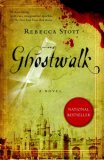Summary | Excerpt | Reading Guide | Reviews | Readalikes | Genres & Themes | Author Bio

“We will have to see you again, Dr. Brooke, without doubt. You will be central
to our enquiries.”
That’s how I came to see another version, their version. Well, not quite see,
but glimpse. The central investigation room at the Parkside Police
Station was filled with filing cabinets and four desks with exaggerated curves
sweeping in different directions; over to the right, a magnetic whiteboard ran
the length of one entire windowless wall. Cuff pulled up a swivel chair for me
on the other side of his desk, carefully clearing away papers and notes into a
drawer and locking it. A collection of objects and photographs had been attached
to the whiteboard with magnets. Curled around those objects were a series of
questions, names, lists, and arrows in coloured marker pens in different hands.
I couldn’t see very much from where I was sitting, so when Cuff went to retrieve
a file from another room, I slipped the digital camera out of my briefcase and
photographed it. A risky act driven by nothing but a terrible, bereaved
curiosity.
A white magnetic board written on in different hands in different colours and a
series of photographs—three dead bodies, one woman drowned in a red coat, two
men with their faces slashed, a wall of graffiti, several photographs of
mutilated cats and horses, the house at Landing Lane, a photograph of Lily
Ridler next to some other people I didn't recognise—animal activists, I
assume—and a photograph of a pile of shredded paper. When I call up the photo on
my laptop and increase the resolution I can pick out details. If you go close
enough you can just see that the blue pen lists two of the murder scenes:
Staircase E of Trinity College and St. Edward’s Passage. And if you go very
close, right up into the right–hand corner—it took me a while to spot
this—there’s a photograph of me next to a photograph of Sarah. It was the
photograph of me that you carried in your mobile phone, filed away carefully, so
that no one would find it. The one you took on Holkham Beach. They must have
gone through all the files in your mobile to find that. Underneath someone had
written my name. Lydia Brooke.
Yes, that whiteboard was the sketchy beginning of the police version of what
came to be known as the Cambridge murders. Murders that would be discussed in
Parliament and produced as evidence to support proposed draconian measures in
the Serious Organised Crime and Police Bill, and which were finally instrumental
in changing British law. Yes, we were making legal history but, of course, we
didn't know that then.
That first conversation did take the best part of an hour because Cuff had so
many questions about my relationship with you, what I had been doing in
Elizabeth’s house, how I had come to know the family, when I had last seen you,
what we had talked about, what you had been wearing, and the context for that
message I left on your phone. Cuff, who affected a relaxed nonchalance composed,
I guessed, to make me drop my guard, summarised my answers and wrote them all
out on lined police paper before reading them back to me in a continuous story,
which he had somehow made from my fragmented answers. I signed it as a “true
account.”
A few months later I tried to put together a more coherent description for the
lawyer representing Lily Ridler in the court case. She asked me to write down
everything I remembered that might have been relevant to the case, from
Elizabeth’s funeral to the days of the trial. I had no ambivalence then about
its truth or about its beginning and ending. That came later. I typed it out in
Kit’s study looking down over the summer garden, two hours a day, until it
seemed about right. Although it read sequentially, I didn’t write it
sequentially. Memory doesn’t work like that. I kept remembering things as I
wrote, things I had thought until then were inconsequential, which might have
been “relevant,” so I went back and tucked them into the story—little details,
thoughts, surmisings, speculations.
Excerpted from Ghostwalk by Rebecca Stott Copyright © 2007 by Rebecca Stott. Excerpted by permission of Spiegel & Grau, a division of Random House, Inc. All rights reserved. No part of this excerpt may be reproduced or reprinted without permission in writing from the publisher.




Discovery consists of seeing what everybody has seen and thinking what nobody has thought.
Click Here to find out who said this, as well as discovering other famous literary quotes!
Your guide toexceptional books
BookBrowse seeks out and recommends the best in contemporary fiction and nonfiction—books that not only engage and entertain but also deepen our understanding of ourselves and the world around us.